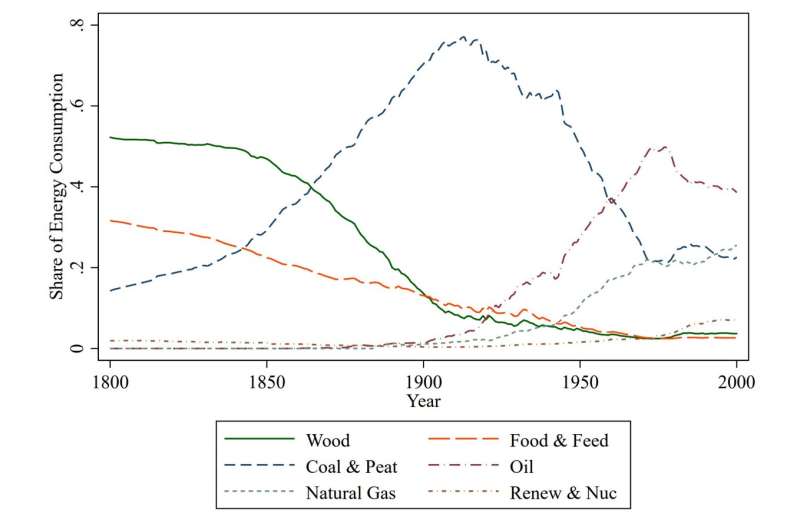
Trends in Mix of Energy Inputs. Notes: Based on data from Henriques and Borowiecki (2017). Credit: National Bureau of Economic Research (2023). DOI: 10.3386/w31365
Historically, coal has offered both benefits and costs to urban areas. In a new paper, researchers examined studies on how differences in the local availability of coal affect a variety of factors, including health and population growth. They conclude that policymakers need to consider both current and future payoffs when designing environmental regulation.
The paper, by researchers at Carnegie Mellon University (CMU) and the University of Montreal, is a National Bureau of Economic Research working paper.
“Benefits of using coal include the energy source’s role in fueling industry and thus employment, while costs include air pollution and its impact on human health,” explains Karen Clay, professor of economics and public policy at CMU’s Heinz College, who coauthored the paper. “In our work, we surveyed three interrelated strands: coal-driven air pollution and health, coal and city growth, and tradeoffs associated with urban coal.”
Studies on air pollution and health suggest negative effects of coal-driven pollution on health, documenting that coal has been a disadvantage in historical contexts. Studies on coal and city growth highlight that coal could have positive or negative effects on growth in city population, depending on the setting and the time period. And studies on tradeoffs associated with coal in urban settings point to the changing nature of production benefits and pollution drawbacks.
“Our analysis suggests that policymakers may underweight longer-run health impacts when choosing to regulate air pollution, putting more weight on the benefits of polluting activities, which in the short run might outweigh the pollution costs,” says Joshua Lewis, associate professor of economics at the University of Montreal, who coauthored the paper. “As a result, it may take time for policymakers to experience the negative effects and choose to enact environmental regulation.”
“Research on the effect of air pollution on spatial location within cities, its evolution across decades, and the associated inequality and environmental justice issues is sparse,” notes Edson Severnini, associate professor of economics and public policy at CMU’s Heinz College, who coauthored the paper. “Our work points to possible avenues for future research, including expanding the range of geographic locations, time periods, outcomes, and types of pollution studied.”
More information:
Karen Clay et al, The Historical Impact of Coal on Cities, National Bureau of Economic Research (2023). DOI: 10.3386/w31365
Citation:
When considering coal as a source of energy, policymakers should examine current and future payoffs, say economists (2023, July 10)
retrieved 12 July 2023
from https://phys.org/news/2023-07-coal-source-energy-policymakers-current.html
This document is subject to copyright. Apart from any fair dealing for the purpose of private study or research, no
part may be reproduced without the written permission. The content is provided for information purposes only.
>>> Read full article>>>
Copyright for syndicated content belongs to the linked Source : Phys.org – https://phys.org/news/2023-07-coal-source-energy-policymakers-current.html
